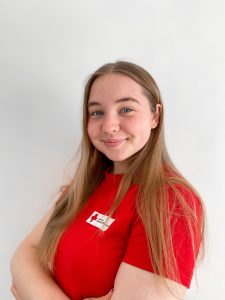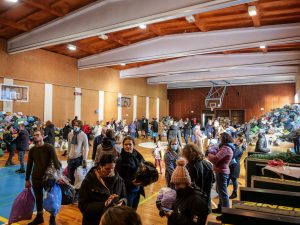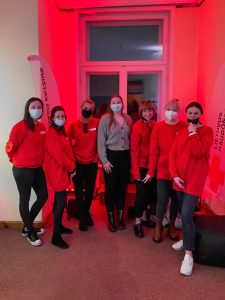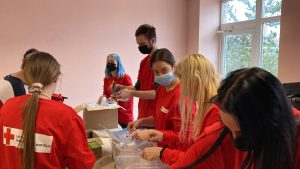A. Ramuckytė: Ukrainians Come as Refugees and Remain as Volunteers
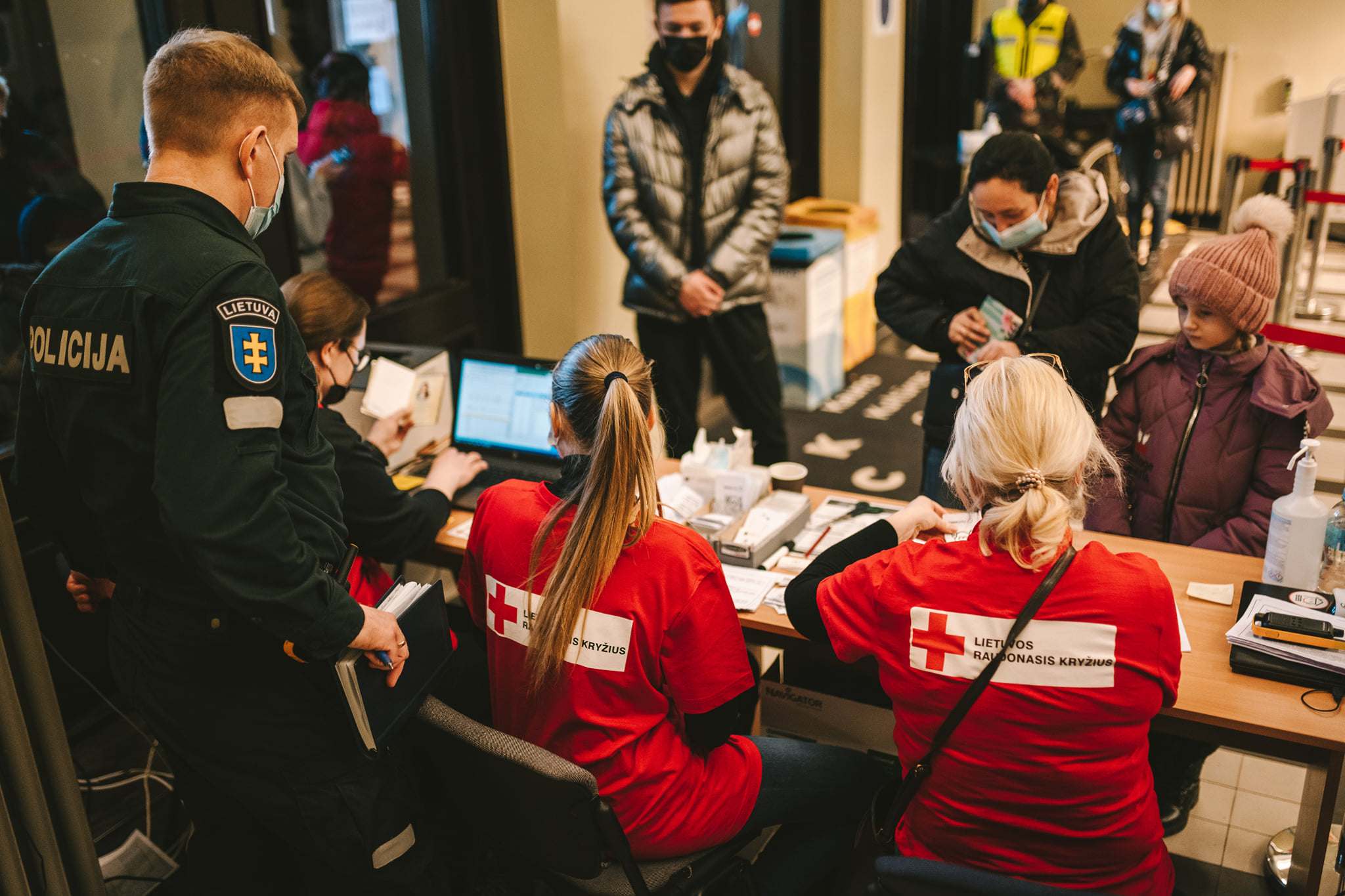
Austėja Ramuckytė is an active student of Vytautas Magnus University (VMU), for whom volunteering is a big part of life. Austėja faced a significant challenge – after discovering the desired job of a volunteer coordinator in the Kaunas Red Cross, two weeks later she had to deal with a critical situation. “I was not yet used to my new duties when the Russian war against Ukraine started and I had to start dealing with the biggest humanitarian crisis Lithuania has not faced before.”
According to Ramuckytė, Ukrainians are wonderful people and we, Lithuanians, must help them. “They are in crisis. In the same way, if it were us, they would help, too. It is evident from their initiative – they are fleeing the war but still want to help others and offer to volunteer. It is always easiest to point fingers and say, ‘Why are we helping Ukrainians, they can do it themselves’… Some angry people ask, ‘Would they help us?’, and we know for sure that they would. If we, the Lithuanians, found ourselves in such a situation, the whole world, and even more so Ukraine, would help. Ukrainians would be the first to open their doors with their arms wide open. You can tell this from the kindness and gratitude of these people – when they come to the registration center or to pick up humanitarian aid, while having nothing themselves, they ask how they could contribute and help us. They come as refugees and remain as volunteers,” says the representative of the Red Cross.
An interview with A. Ramuckytė about about the phenomenon of volunteering and unity in the face of aggression.
Tell us, how did you discover volunteering and eventually became a volunteer coordinator?
I started volunteering when I was 15 years old and volunteered in various organizations. I spent most time volunteering in the Lithuanian School Student Union (LMS), where I have experienced the taste of real volunteering.
Until then, I had no volunteer experience and hardly imagined how it’s done. I was brought into volunteering by my friends who showed me what it was. And after getting to know it better and feeling the fulfillment that it provides, I started to actively volunteer in other activities, events, marathons and hikes. Wherever I find an invitation or opportunity, I sign up and volunteer.
I got into the Red Cross because I decided I wanted to continue volunteering, and I felt that I could already share my experience with others. I have a clear picture of what volunteering, working with volunteers, a team and an organization should look like. So I was very lucky that the Red Cross was just looking for a volunteer coordinator in Kaunas.
International Politics and Development studies in English at VMU are also relatively close to what I do at the Red Cross. Of course, we try not to politicize here. Studies and university add eloquence and skills to work with people, audience and coordination. They provide diplomatic skills. I have lectures where we learn about non-governmental organizations – it’s very interesting and very useful to hear about it from a theoretical point of view and then put it into practice and see how it works in reality. I’m glad that the studies and my current work are compatible.
What do you think generally leads and keeps a person volunteering?
Initially, these may be external factors such as mandatory hours of volunteering at school, the influence of friends or other factors. But after a while you start feeling a strong motivation from within as well as a sense of usefulness in terms of how much and what you can do. It provides spiritual benefits, a kind of recharge and then you look for opportunities to stay there longer or think about where else you could contribute. It’s always a prestige to be in some kind of voluntary organization and volunteer, especially when such horrible things are happening.
People always want to feel like they belong somewhere and volunteering can provide just that. This is especially true in crisis situations, both personal and global. When a tragedy such as the war in Ukraine, the humanitarian crisis of war refugees or a pandemic strikes, it mobilizes and attracts new people who haven’t even thought about volunteering in “calm circumstances” before, but seek unity during times of emergency. Organizations such as the Red Cross, Maltesers, and Caritas create a sense of community and unity.
A lot of people in my circle of friends are engaged in volunteering. My classmates also volunteer at the Red Cross and it’s really fun reading the volunteer lists and seeing people I know. I’m happy that I don’t get pressure from my peers for rushing to do something after the lectures and engaging in activities other than studies and entertainment because they also live versatile and, I believe, meaningful lives. We are very proud of each other and receive many kind words that such people are needed.
Tell us, how do you manage work during such stressful times?
In the face of the humanitarian crisis, Kaunas is doing very well and the volunteers are amazing. As I jokingly say, I came to work at the Red Cross at the right time because all people are so fired up and full of motivation. My phone doesn’t stop ringing, I get countless calls every day from people who want to volunteer and receive emails offering help and assistance. Everyone who helps is very benevolent and friendly, so it is very easy to do what I do. Without the volunteers, we would be nothing.
The main resources of our volunteers are now at the registration center in Kaunas, which is open 24 hours a day. Volunteer shift schedules are drawn up and work takes place 24/7. It is quite a challenge to arrange the schedule so that there are no “holes” in it. There are many who want to help, but we invite Russian-speaking people to the registration center because we need to communicate with Ukrainian refugees and provide all the necessary information. In other activities, such as collecting, sorting and distributing humanitarian aid, Russian language is not necessary.
Of course, when I see critical comments on social networks asking why we’re even helping Ukrainians, I try to avoid reading because it is truly outrageous. What’s surprising is that these comments come from relatively young people who have never seen war and can’t even imagine what kind of people are coming here and what their inner state is. My colleagues and I are brought to tears at least several times a day and sometimes we cry together with Ukrainian families who come to ask for help.
What can you tell about the Ukrainians who are arriving here, how do they view our country and what kind of help do they need?
When the war broke out, the first refugees from Ukraine came to Lithuania because they had relatives or acquaintances here and had a place to stay. For those who arrive now, Lithuania is not necessarily the direct choice, but when managing flows, for example, in Poland, they are directed to our country. Therefore, Ukrainians arriving now have nowhere to live and our task is to find temporary accommodation for war refugees with the help of the “Strong Together” database.
Lithuania is certainly no stranger to Ukrainians – they know us well, they hear how much we Lithuanians try to do our best and help Ukraine, and they are very grateful. Therefore, they are not afraid to come to Lithuania and to some extent feel at home. They do not experience culture shock. Of course, they are also inspired by the history of our country and our struggles for freedom.
As I mentioned previously, people want a sense of belonging, so we need to try to rekindle that feeling and help not only with accommodation or humanitarian aid, but also with various inclusive and cultural programs, among other things.
Ukrainians settling in Lithuania really need more than just basic necessities. For example, today I was contacted by a Ukrainian mother who is looking for an acoustic guitar for her son because he is still preparing for the upcoming exam and wants to rehearse… Of course, we are not able to provide everything, but it would be good to have some kind of platform where Ukrainians themselves could ask and search for various things, services, ways to spend their free time, and finally, look for friends and other Ukrainians living nearby.
We want to create a sense of community and coziness of home as there are some Ukrainians who will not return to their homes even after the war ends because, as we can see from the images, some cities will have to be rebuilt from the ground up. Of course, those Ukrainians will not be seen as war refugees, they will integrate and become residents of Lithuania, so the sooner they adapt here, the better it will be for us as a country.

